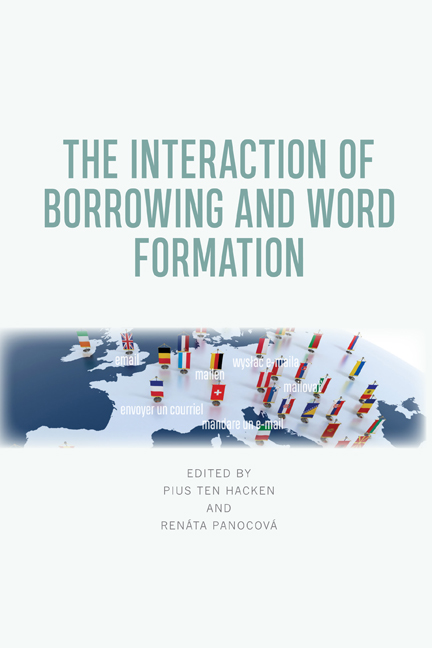Book contents
- Frontmatter
- Contents
- List of Figures and Tables
- List of Contributors
- Preface
- List of ISO-639 Language Codes
- Introduction
- 1 Word Formation, Borrowing and their Interaction
- Part I Compounding
- 2 Compounding and Contact
- 3 Neoclassical Compounds between Borrowing and Word Formation
- 4 Borrowed Compounds, Borrowed Compounding – Portuguese Data
- 5 Compound Calques in an Eighteenth-Century German-Lithuanian Dictionary
- 6 (Pseudo-)Anglicisms as Nominal Compounds in Italian
- Part II Affixation
- 7 The Role of Borrowing in the Derivation of Passive Potential Adjectives in Polish
- 8 How an ‘Italian’ Suffix Became Productive in Germanic Languages
- 9 The Suffixes -ismus and -ita in Nouns in Czech
- 10 The Interaction between Borrowing and Word Formation: Evidence from Modern Greek Prefixes
- Part III Naming in Minority Languages
- 11 Loanword Formation in Minority Languages: Lexical Strata in Titsch and Töitschu
- 12 Examining the Integration of Borrowed Nouns in Immigrant Speech: The Case of Canadian Greek
- 13 Interaction among Borrowing, Inflection and Word Formation in Polish Medieval Latin
- Conclusion
- 14 Trends in the Interaction between Borrowing and Word Formation
- Author Index
- Subject Index
14 - Trends in the Interaction between Borrowing and Word Formation
Published online by Cambridge University Press: 22 September 2020
- Frontmatter
- Contents
- List of Figures and Tables
- List of Contributors
- Preface
- List of ISO-639 Language Codes
- Introduction
- 1 Word Formation, Borrowing and their Interaction
- Part I Compounding
- 2 Compounding and Contact
- 3 Neoclassical Compounds between Borrowing and Word Formation
- 4 Borrowed Compounds, Borrowed Compounding – Portuguese Data
- 5 Compound Calques in an Eighteenth-Century German-Lithuanian Dictionary
- 6 (Pseudo-)Anglicisms as Nominal Compounds in Italian
- Part II Affixation
- 7 The Role of Borrowing in the Derivation of Passive Potential Adjectives in Polish
- 8 How an ‘Italian’ Suffix Became Productive in Germanic Languages
- 9 The Suffixes -ismus and -ita in Nouns in Czech
- 10 The Interaction between Borrowing and Word Formation: Evidence from Modern Greek Prefixes
- Part III Naming in Minority Languages
- 11 Loanword Formation in Minority Languages: Lexical Strata in Titsch and Töitschu
- 12 Examining the Integration of Borrowed Nouns in Immigrant Speech: The Case of Canadian Greek
- 13 Interaction among Borrowing, Inflection and Word Formation in Polish Medieval Latin
- Conclusion
- 14 Trends in the Interaction between Borrowing and Word Formation
- Author Index
- Subject Index
Summary
This volume originated from a concern that the disciplinary boundaries within the field of linguistics hamper the study of the interaction between borrowing and word formation. As explained in the introduction, borrowing is studied in fields such as lexicography and contact linguistics, whereas word formation is usually placed in morphology. The case studies in the volume look at particular phenomena in particular languages and linguistic environments. In this conclusion, we aim to summarise some findings by generalising about the case studies.
On the basis of the case studies, we identified three specific topics that are important in the interaction between borrowing and word formation and occur in several languages and linguistic environments. In the first three sections, we will therefore discuss neoclassical word formation, internationalisms and Anglicisms. The remaining two sections will be devoted to other observations in the domains of compounding and affixation. In the latter domain, we cover not only derivation but also word markers.
Neoclassical word formation
If there is a prototypical phenomenon linked to the interaction of borrowing and word formation, it must be neoclassical word formation. There is a sizeable literature about this topic, but most of it takes a single language as a focus. The way the main research questions are framed depends on one hand on the language in which neoclassical word formation is studied and on the other on the theoretical framework adopted for the study. From a morphological perspective, typical questions include whether neoclassical word formation is a separate phenomenon and what is the status of the neoclassical components in the language system. Thus, Bauer (1998) argues against a separate system of neoclassical word formation and Scalise (1984: 75–76) argues that neoclassical formatives are stems rather than affixes. From a lexicographic perspective, a central question is how individual formations can be traced back to their origin. In his overview of mechanisms in etymology, Durkin (2009: 108–110) discusses what he calls neoclassical combining forms in his chapter on compounding.
Much of the discussion of neoclassical word formation is based on English data. Joseph (Chapter 2, this volume) considers how borrowings from Greek and Latin into English affect the word formation system, in particular in technical vocabulary. One of his examples is (1).
- Type
- Chapter
- Information
- The Interaction of Borrowing and Word Formation , pp. 281 - 292Publisher: Edinburgh University PressPrint publication year: 2020



